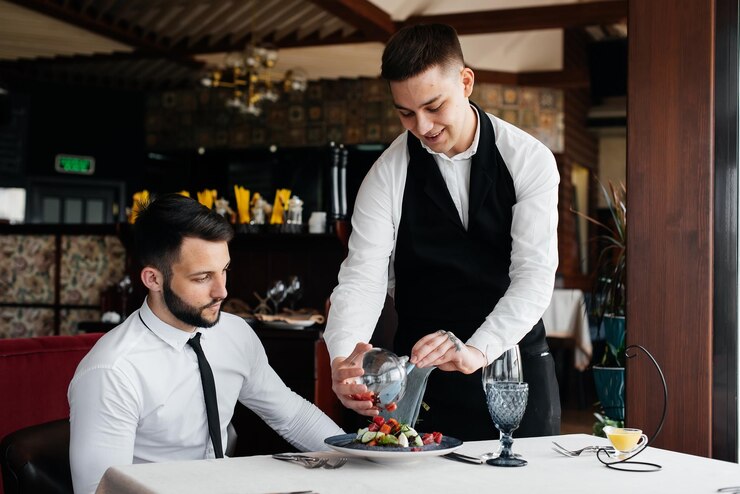Table of Contents
- Communication and Active Listening
- Problem-Solving and Multitasking
- Stamina and Endurance
- Teamwork and Collaboration
- Time Management and Organization
- Professionalism and Courtesy
- Server Sales Skills and Menu Knowledge
Being a great server takes more than just knowing the menu inside and out. While food and drink knowledge is important, there are several other crucial skills that servers in Canada need to provide exceptional service. From interpersonal abilities to time management prowess, these competencies can elevate your performance and tips. Master these 7 essential skills to become an outstanding server.
Communication and Active Listening
Effective communication is the backbone of excellent customer service. As a server, you need to listen attentively to each diner’s requests, repeat orders back for confirmation, and respond clearly. Use positive body language like making eye contact and nodding to show engagement. Ask thoughtful follow-up questions to better understand any special needs, preferences or dietary restrictions. Strong communication also involves reading nonverbal cues – does the guest seem rushed, confused or dissatisfied? Adapt your approach accordingly.
The ability to communicate extends beyond guests too. You’ll need to convey specifics about orders and any modifications to kitchen staff. Update your teammates if you need support or backup. And you may need to firmly but politely address any disruptive behaviour from difficult patrons. Refine both your verbal and written communication skills.
Furthermore, servers should be prepared to make friendly small talk and banter to create an enjoyable, hospitable atmosphere. Have a few light conversation starters at the ready about local events, weather, sports, etc. Read social cues to gauge if chattiness is welcome or if diners prefer to be left alone. Adjust your level of engagement accordingly. The best servers are adaptable conversationalists.

Problem-Solving and Multitasking
The restaurant floor is a fast-paced environment where challenges can arise at any moment – incorrect orders, spills, difficult customers. Top servers smoothly juggle multiple tasks while quickly resolving issues with a level head. Stay organized by using tools like pads to track orders. Prioritize logically – for example, greeting and seating new arrivals takes precedence over straightening already seated tables. Think critically to decipher the most efficient sequence for tasks.
Most importantly, employ creative problem-solving skills to address the inevitable curveballs thrown your way. If a dish is delayed, offer bread or an appetizer. Recommend menu alternatives if something is 86’d. Remain unflappable if the computer system goes down. Use smart judgement to determine whether to personally resolve an issue or loop in a manager. The best servers firefight gracefully.
When the unexpected occurs, keep your cool and don’t let stress derail your service. If a difficult situation arises with a guest, remove yourself briefly to reset before attempting to resolve it. Draw upon improvisation skills to think on your feet. And maintain a positive, solutions-oriented mindset focused on making it right.
Exemplary servers are outstanding multitaskers. You may need to takes orders for one table while making recommendations to another, all while monitoring pacing for your other tables. Develop a system and routine, but also be able to adapt when circumstances change. Prioritize which tasks need your immediate attention. Work efficiently but not so quickly that you compromise your team’s communication and attention to detail.

Stamina and Endurance
Long shifts dashing between tables, carrying heavy trays, and being on your feet for hours demand incredible physical stamina. Maintain high energy levels by staying hydrated and eating nutritious meals during breaks – skip greasy staff meals that will make you crash. Choose supportive, slip-resistant footwear designed for the rigors of the job. Slowly build strength and endurance through exercise routines that focus on cardiovascular health, core, and lower body muscles. Consider cross-training to keep your body guessing and engage different muscle groups.
Smart servers also recognize the importance of mental stamina to remain sharp during chaotic rushes. Practice mindfulness and breathing techniques to keep focused and avoid burnout. Get plenty of rest on your days off. Take micro-breaks when possible, even if just 60 seconds to reset. Staying mentally and physically fresh allows you to operate at peak performance.
To prevent burnout, practice self-care activities outside of work like yoga, meditation, sports, and other hobbies that help relieve stress. You’ll return to each shift refreshed rather than running on fumes from the previous one. Establish firm boundaries around your days off to fully recharge. Your health and wellbeing is as vital as your technical service skills.

Teamwork and Collaboration
No server is an island – you’re part of a unified front-of-house team working toward the common goal of creating an amazing dining experience. Clearly communicate your needs, status updates, and any pertinent guest information to teammates. Jump in and assist others when they need an extra hand, and have their back during crunch times. More experienced servers should mentor and help train newer colleagues. Approach the role with a spirit of collaboration rather than competition.
You’ll also need to work closely with kitchen staff. Develop a rapport so you can smoothly relay orders and any modifications. Update them on delays or issues. Have each other’s back and show mutual respect across roles. Be solution-oriented in resolving any conflicts through open and respectful communication rather than accusations. Together you can wow every guest.
Furthermore, view managerial staff as partners working toward the same objective. Check in with them periodically and provide feedback on anything impacting service. Listen to their guidance and directives. Follow all policies and procedures they implement – rules are in place to ensure smooth operations and excellent hospitality.

Time Management and Organization
With multiple tables to juggle, prime time rushes, and meal courses to properly pace, skilled servers are masters of managing their time. Use organizational hacks like making detailed floor maps and developing efficient routes between tables and kitchens. Properly prioritize tasks to ensure no table feels neglected. For example, take drink orders for new arrivals first before checking on seated tables. Pace bartenders on cocktails so drinks arrive shortly after apps.
Learn to read pacing cues from tables – have they slowed down on eating and may want dessert menus soon? Are they rushing and want the check brought promptly? Adapt your game plan fluidly as situations evolve. And be prepared to triage and reassign tables if your section overcrowds or teammates become in the weeds.
Use technology to your advantage – master using any restaurant management software or ordering systems to their fullest capabilities. See if there are organizational apps or tools that can streamline operations for you. Always have backup plans like pen and paper in case tech fails.

Professionalism and Courtesy
Rude or unprofessional behavior can quickly ruin a dining experience. Servers should treat every guest with unwavering politeness, patience and respect, regardless of the situation. Stay calm under pressure, apologize sincerely for any mistakes, and maintain high grooming standards.
Develop a thicker skin to handle the occasional unreasonable customer. Kill them with kindness, and resist taking harsh comments personally. At the same time, hold firm boundaries and do not tolerate abusive behavior, discrimination or harassment. Know when to remove yourself from an unacceptably hostile situation.
Project an air of confidence and competence through your demeanor. studiiously uphold all health, safety and food handling protocols. Strive to become extremely knowledgeable about the restaurant, menu, ingredients and beverages. Your professionalism and expertise will foster guest trust.

Server Sales Skills and Menu Knowledge
While extensive food and drink knowledge is expected, top servers use this expertise to suggestively sell and maximize revenue. Describe dish features enthusiastically, recommend beverage and appetizer pairings, and suggest appropriately priced upsells and specials. Read tables for cues about budget and preferences.
Tell an engaging story about seasonal menu items or the chef’s creative process. Tap into your acting abilities to convey genuine excitement about the offerings. Use vivid sensory details highlighting flavors, aromas and plating. Get guests craving the items.
Successful servers are also skilled at reading guests. Pick up on cues about pacing and attentiveness levels. Gauge when to push sales or lay off based on body language. Be a thoughtful consultor, not an overly aggressive salesperson.
By developing this powerful skill set that goes far beyond menu expertise, servers in Canada can elevate their craft and optimize the guest experience. Mastering these competencies leads to higher tips, better reviews, and greater career opportunities in the service industry



